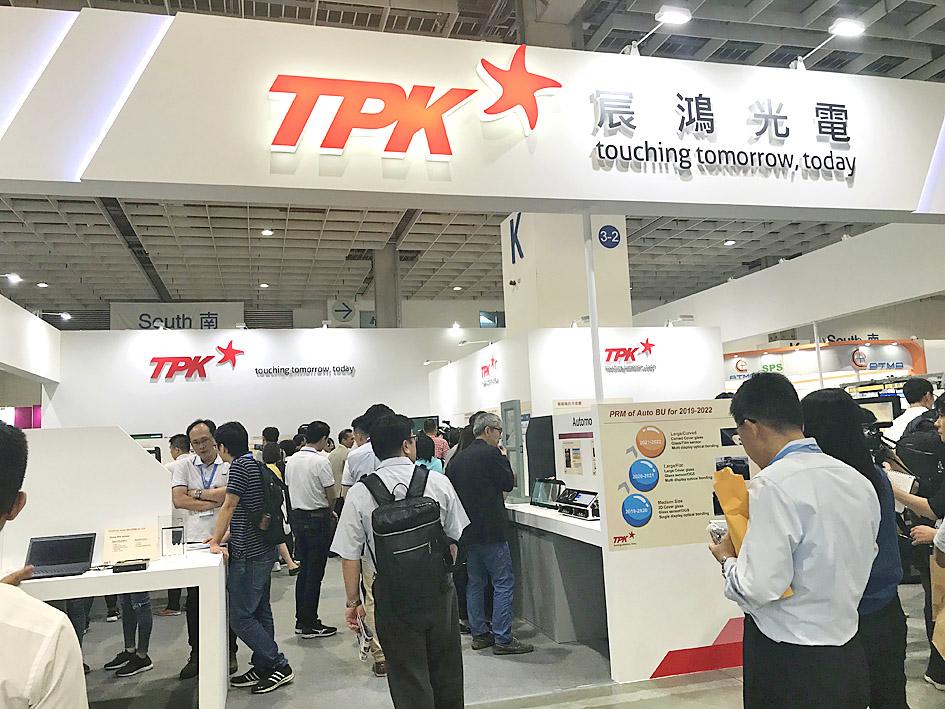TPK Holding Co (宸鴻), a supplier of touch modules and touch sensors, yesterday posted its strongest first-quarter net profit in about four years, thanks to rush orders from mobile phone customers and strong demand for tablets due to the COVID-19 pandemic.
The growth momentum is expected to weaken this quarter as the industry enters a slow season, before new orders begin in preparation for the second-half shopping season, TPK said.
Revenue might fall 10 to 15 percent sequentially this quarter, from last quarter’s NT$29.19 billion (US$1.04 billion) based on experience over the past few years, TPK said.

Photo: Chen Mei-ying, Taipei Times
“The electronics industry usually faces corrections in the second quarter, when a peak season ends, while the next is still far away. The company usually sees a sequential decline in revenue during the second quarter,” TPK chief strategy officer Freddie Liu (劉詩亮) said.
Operating margin might hold steady this quarter compared with last quarter’s 0.2 percent, meaning that TPK would remain profitable, Liu said.
Operating margin is underpinned by robust demand for touch products with better margins used in tablets and notebook computers, while demand for touch products in mobile phones dwindles, he said.
For the whole year, TPK expects revenue to trend down on an annual basis as mobile phone customers undergo a product transition period and scale back orders, Liu said.
Handset and wearable touch products contributed to about 27 percent of revenue in the first quarter, while tablets and notebooks accounted for 68 percent, it said.
TPK dashed hopes that it might recoup orders from Apple Inc to supply foldable touch modules after CEO Leo Hsieh (謝立群) said that no timetable had been set to produce small foldable touch products using its silver-nanowire technology, which is considered a cost-effective method to make such displays.
There had been speculation earlier this week that Apple planned to launch its first foldable phones in 2023 using TPK’s foldable touch modules.
The silver-nanowire technology is widely used to make large touch displays for meeting rooms and whiteboards in classrooms, Hsieh said.
TPK’s net profit grew more than eightfold to NT$350 million during the quarter ended in March, compared with NT$40 million in the same period last year. The expansion was aided by an increase in non-operating income to NT$305 million, compared with NT$222 million in the previous quarter and NT$179 million in the first quarter last year.
Operating profit contracted 17.6 percent year-on-year, or 28.3 percent quarter-on-quarter, to NT$834 million last quarter.
It was a sequential expansion of 45.23 percent from NT$241 million earned in the final quarter last year, or earnings per share of NT$0.86, from NT$0.1 a year earlier and NT$0.59 a quarter earlier.

To many, Tatu City on the outskirts of Nairobi looks like a success. The first city entirely built by a private company to be operational in east Africa, with about 25,000 people living and working there, it accounts for about two-thirds of all foreign investment in Kenya. Its low-tax status has attracted more than 100 businesses including Heineken, coffee brand Dormans, and the biggest call-center and cold-chain transport firms in the region. However, to some local politicians, Tatu City has looked more like a target for extortion. A parade of governors have demanded land worth millions of dollars in exchange

Hong Kong authorities ramped up sales of the local dollar as the greenback’s slide threatened the foreign-exchange peg. The Hong Kong Monetary Authority (HKMA) sold a record HK$60.5 billion (US$7.8 billion) of the city’s currency, according to an alert sent on its Bloomberg page yesterday in Asia, after it tested the upper end of its trading band. That added to the HK$56.1 billion of sales versus the greenback since Friday. The rapid intervention signals efforts from the city’s authorities to limit the local currency’s moves within its HK$7.75 to HK$7.85 per US dollar trading band. Heavy sales of the local dollar by

Taiwan Semiconductor Manufacturing Co’s (TSMC, 台積電) revenue jumped 48 percent last month, underscoring how electronics firms scrambled to acquire essential components before global tariffs took effect. The main chipmaker for Apple Inc and Nvidia Corp reported monthly sales of NT$349.6 billion (US$11.6 billion). That compares with the average analysts’ estimate for a 38 percent rise in second-quarter revenue. US President Donald Trump’s trade war is prompting economists to retool GDP forecasts worldwide, casting doubt over the outlook for everything from iPhone demand to computing and datacenter construction. However, TSMC — a barometer for global tech spending given its central role in the

An Indonesian animated movie is smashing regional box office records and could be set for wider success as it prepares to open beyond the Southeast Asian archipelago’s silver screens. Jumbo — a film based on the adventures of main character, Don, a large orphaned Indonesian boy facing bullying at school — last month became the highest-grossing Southeast Asian animated film, raking in more than US$8 million. Released at the end of March to coincide with the Eid holidays after the Islamic fasting month of Ramadan, the movie has hit 8 million ticket sales, the third-highest in Indonesian cinema history, Film